| |
| |
| |
| Presented By Brilliant |
| |
| Axios World |
| By Dave Lawler · Mar 30, 2023 |
| Welcome back to Axios World. - We start tonight (1,905 words, 7 minutes) with democracy, move to the terrible news of a WSJ reporter's arrest in Russia and transit through Taiwan.
- Situational awareness: Turkey's parliament just approved Finland's NATO membership, clearing the way for the Nordic country to join the alliance and more than double the length of its border with Russia.
New arrival? Subscribe. |
| |
| |
| 1 big thing: Biden's democracy summit poses awkward questions |
 Data: U.S. State Department; Map: Madison Dong/Axios Visuals President Biden declared at this week's Summit for Democracy that the tide is turning in the global struggle between democracies and autocracies. Driving the news: In drawing up invitations, though, Biden had to make some awkward calls as to which countries fall on which side. - The White House considered rescinding Israeli Prime Minister Benjamin Netanyahu's invitation while he was doubling down on his controversial judicial reforms, Axios' Barak Ravid reports. In the end, Netanyahu did make a virtual address after pausing the legislation.
- So did Indian Prime Minister Narendra Modi, one week after opposition leader Rahul Gandhi received a two-year prison sentence for remarking that "all thieves have Modi as their surname."
- Pakistan was invited despite its own democratic turmoil and weak civilian institutions, but declined, apparently in deference to China. Beijing slammed the summit as divisive and "more about group politics than democracy."
- NATO ally Turkey wasn't invited. Neither were several strategically important countries the administration has been courting in regions like Central Asia and the Indo-Pacific.
Flashback: Biden set himself up for a headache when he raised the idea of a democracy summit on the 2020 campaign trail. - Calling the summit "a bad idea that won't go away," Council on Foreign Relations president Richard Haass tweeted this week: "Beyond the awkward 'whom to invite' issue, American democracy is hardly a model for others. Plus we need non-democracies to help us in the world, from sanctioning Russia to slowing climate change."
- Other summit critics have accused Biden of highlighting democracy selectively: yes when rallying votes to condemn Russia over Ukraine; no when resetting ties with Saudi Arabia.
Yes, but: Sensitive to the perception that the U.S. is holding itself up as a lone paragon of democracy, the administration invited Costa Rica, the Netherlands, South Korea and Zambia to co-host the mostly virtual event. - In a recent interview, USAID administrator Samantha Power told Axios that to push countries on democracy and human rights without acknowledging America's own challenges would be "tone deaf in the extreme."
No leader is going to fundamentally change their behavior just to earn an invitation to these virtual summits, but they could provide a useful platform for civil society, says Marti Flacks, director of the human rights initiative at CSIS. - The administration announced an initiative this week to ban commercial spyware and pledged $690 million for various democracy-related programs.
- Some of that money will be used to help democratic reformers in countries like Zambia or Moldova deliver economically, Power told Axios. "We are now shifting to seeing the connection between economic results and political legitimacy."
The bottom line: While the pros and cons of holding these summits are much debated, Biden's broader claim about the global democratic trajectory isn't unfounded. In its annual report on the state of global democracy, Freedom House described 2022 as a possible "turning point." |
    |
| |
| |
| 2. American reporter arrested in Russia |
| Evan Gershkovich. Photo: Wall Street Journal handout Russian authorities on Thursday said they had arrested Evan Gershkovich, an American reporter for the Wall Street Journal, on espionage charges. State of play: National Security Council spokesperson John Kirby condemned the arrest and reiterated the State Department's guidance that U.S. citizens inside Russia should "depart right away." Kirby said it was too early to say whether the arrest was a retaliatory move by the Kremlin. Two other arrests on our radar: - An alleged Russian spy attended Johns Hopkins University's elite foreign affairs graduate program in Washington, posing as a Brazilian student, and was set to begin an internship at the International Criminal Court before being arrested last April, WaPo reports.
- A Russian man who was sentenced in absentia to two years in jail after his 12-year-old daughter's school reported her for an anti-war drawing was captured today in Belarus. He had fled there, apparently anticipating a guilty verdict.
|
    |
| |
| |
| 3. Global news roundup: Bolsonaro is back |
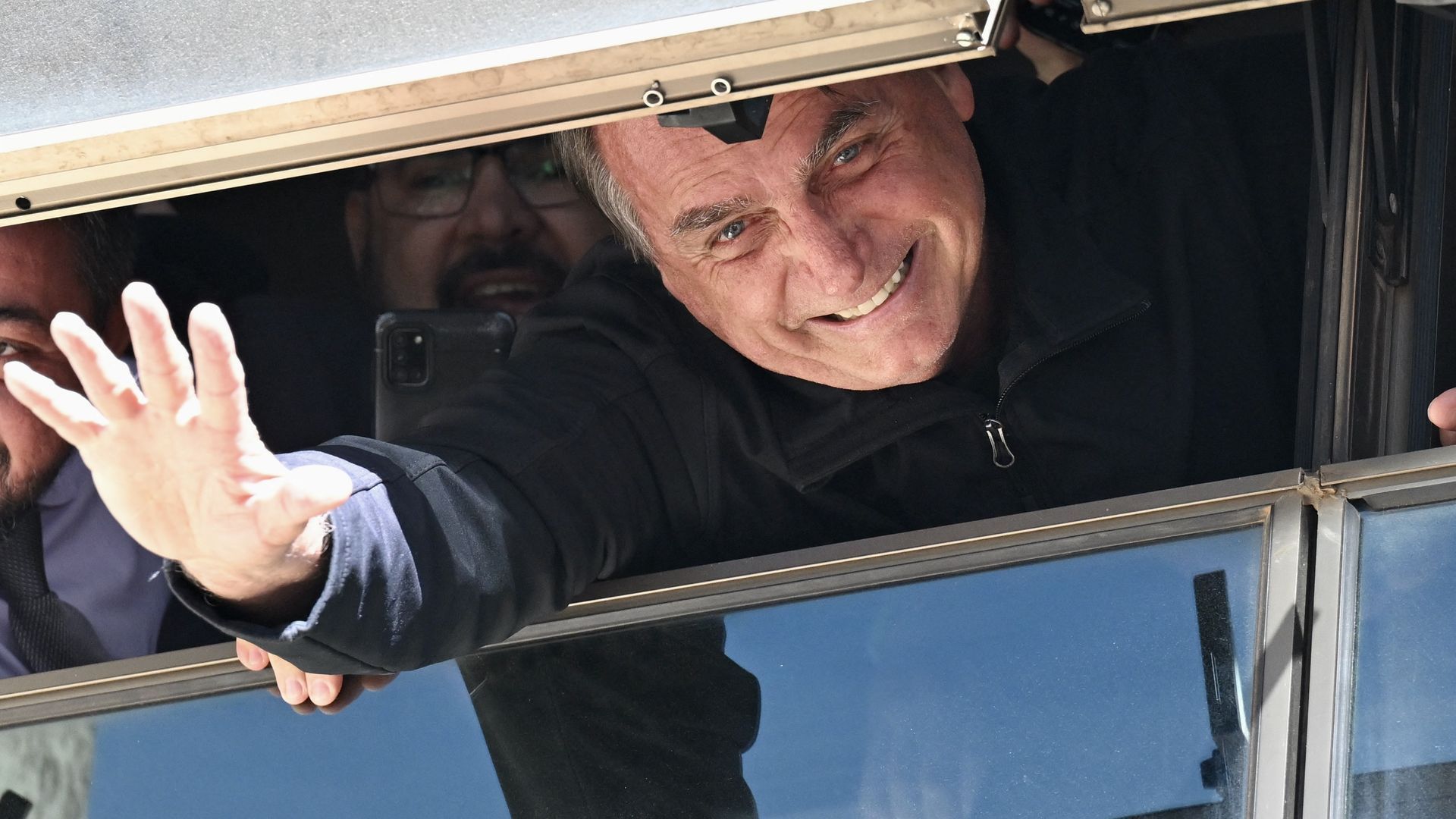 |
|
| Former Brazilian President Jair Bolsonaro greets supporters outside Liberal Party headquarters in Brasília today. Photo: Evaristo Sa/AFP via Getty Images |
| |
| 1. Former Brazilian President Jair Bolsonaro landed in Brazil this morning for the first time since he skipped the Jan. 1 handover of power and headed to Florida. - Bolsonaro faces a slew of investigations, including into whether he incited a Jan. 8 attack on government buildings. The far-right leader denies any wrongdoing.
- What to watch: During his three months in Florida, a number of other right-wing figures back in Brazil made names for themselves. "If Bolsonaro cannot quickly show that he can lead, the right will look for other leaders, like the governors of Sao Paulo and Minas Gerais," Andre Cesar of Hold Legislative Advisors told Reuters.
2. Russia is offering North Korea food and other incentives in exchange for munitions, White House spokesperson John Kirby said today. The U.S. sanctioned a Slovakian arms dealer for trying to broker such a deal. - Meanwhile... the first German (Leopard 2) and British (Challenger) tanks have arrived in Ukraine.
3. Mexican authorities say they've detained eight suspects in connection to the fire at a migrant facility in Ciudad Juárez that left at least 39 dead after a video showed security guards leaving people behind bars before fleeing, Axios Latino's Marina E. Franco writes. 4. Thousands of supporters of Kenyan opposition leader Raila Odinga held a third round of protests today in Nairobi over inflation and joblessness. A ruling party office in western Kenya was also torched. Odinga claims the presidential election last August was stolen from him, but the courts upheld the result. |
    |
| |
| |
| A message from Brilliant |
| AI won't take your job, but someone using AI will |
| |
 |
| |
| Future-proof your skill set with Brilliant and learn the concepts behind tech like AI, neural networks and more. Here's how: Brilliant's bite-sized interactive lessons let busy people grow their skills in minutes a day. Join 10M+ people learning on Brilliant — try it for free, then get 20% off. |
| |
| |
| Bonus: Where in the World |
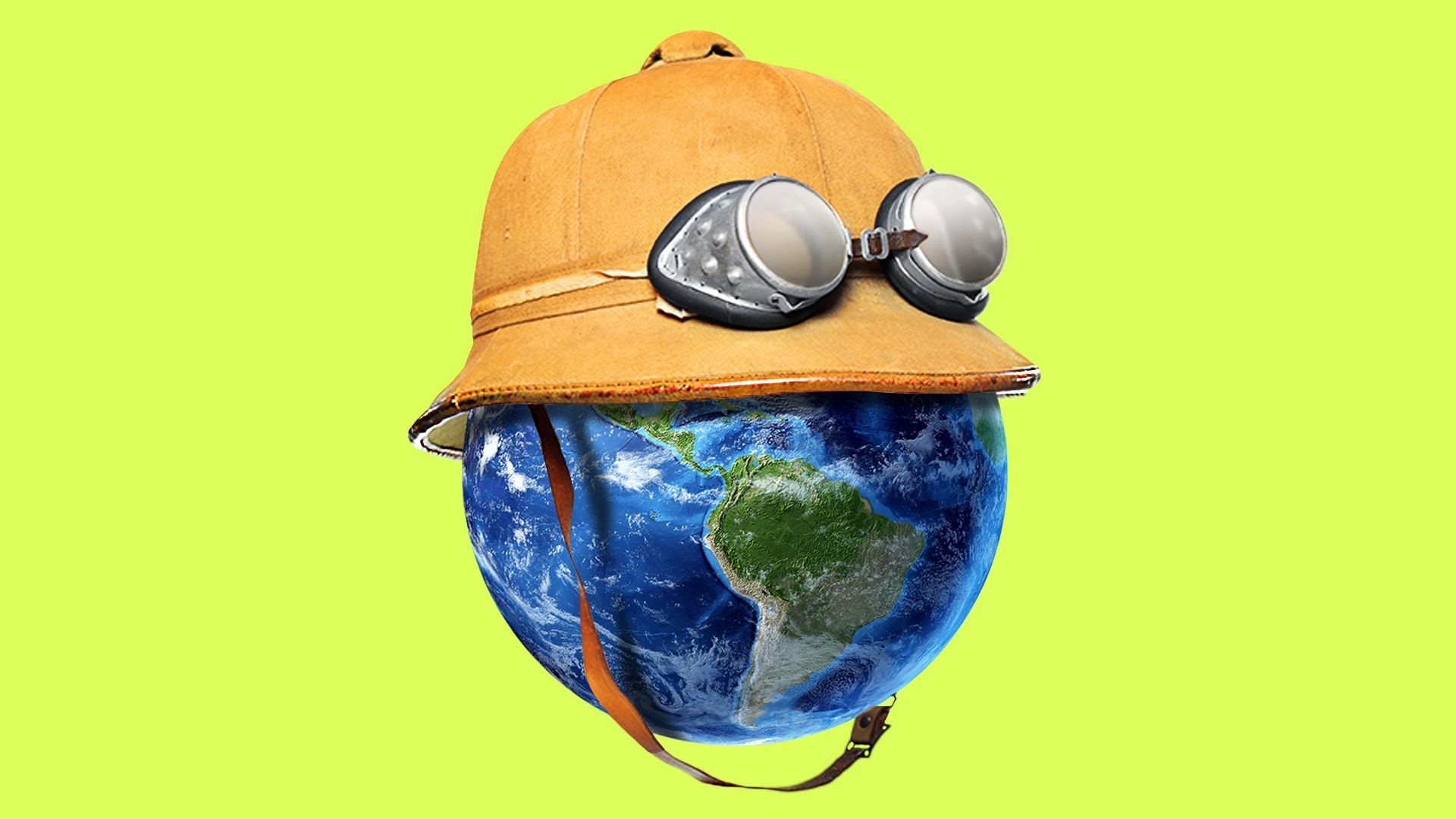 |
|
| Illustration: Natalie Peeples/Axios |
| |
| Today's theme is European history. Can you name the modern European capital city in which each of the following events took place? - Plato was born here in the fourth century B.C.
- Julius Caesar crossed the Rubicon and returned here at the head of an army in 49 BC.
- A landmark voyage from Europe to Asia by sea set sail here in 1497.
- A magnificent cathedral with nine domes was completed here in 1561.
- An order of Catholic knights established their headquarters here and began fortifying it in 1566. Hint: It's on an island.
- A monarch was publicly executed here in 1793.
- The European powers met here in 1814-1815 to discuss a new order after the downfall of Napoleon.
- Archduke Franz Ferdinand was assassinated here in 1914.
- British forces suppressed an insurrection here in 1916.
- This city had to be partially supplied from the air in 1948-1949 due to an early Cold War showdown.
- A major security treaty was signed here in 1955.
- Soviet tanks rolled in here in 1968 to crush a period of political liberalization.
Scroll to the bottom for answers. |
    |
| |
| |
| 4. China warns of "serious confrontation" |
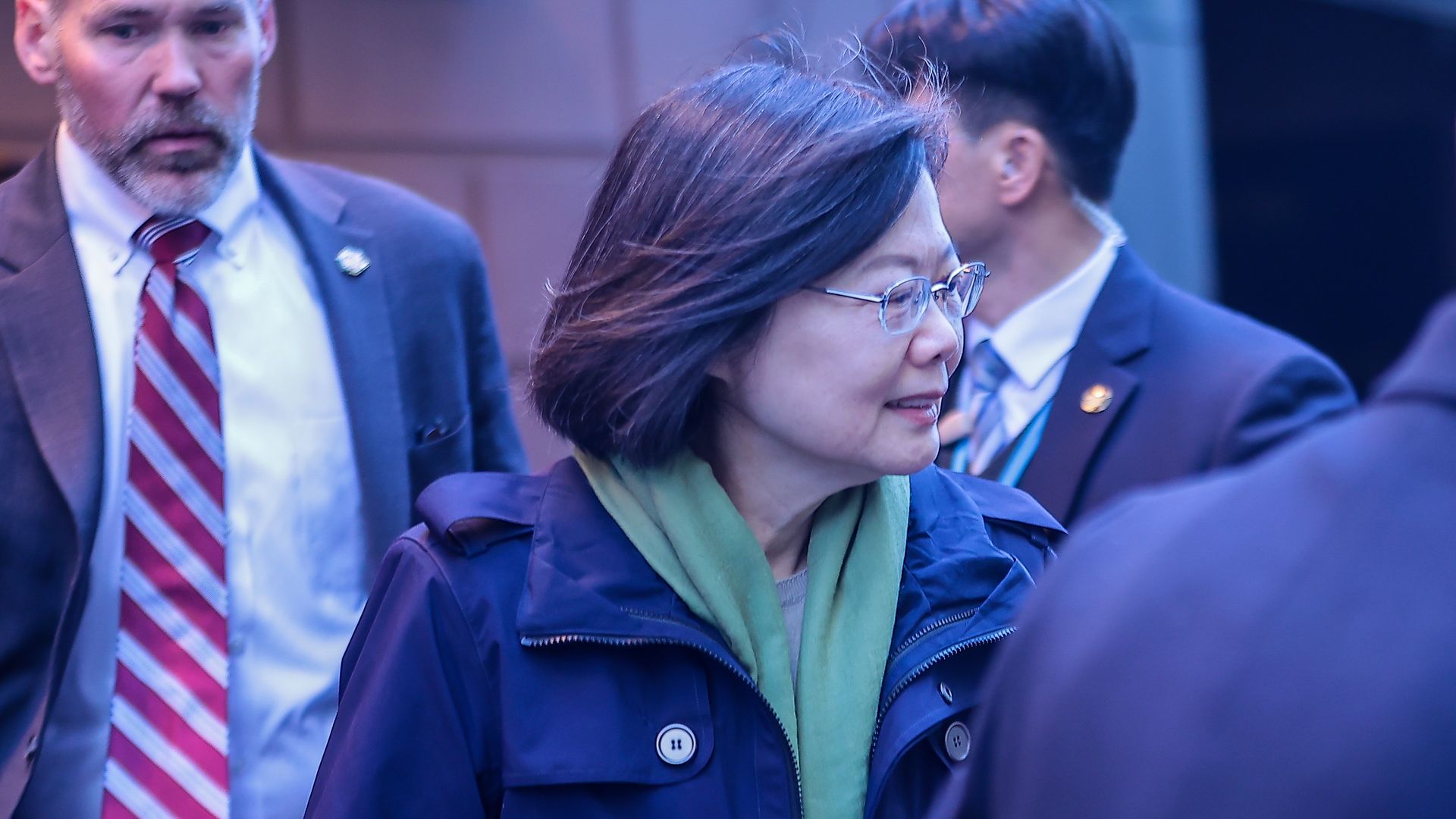 |
|
| Taiwanese President Tsai Ing-wen today in New York. Photo: Selcuk Acar/Anadolu Agency via Getty Images |
| |
| The top diplomat at China's embassy in Washington briefed reporters Wednesday, as Taiwanese President Tsai Ing-wen arrived in New York, that Tsai's visit "could lead to serious, serious, serious confrontation in the U.S.-China relationship." Driving the news: Tsai is expected to travel to Belize and Guatemala after New York, and then stop in California next week to give a speech and meet House Speaker Kevin McCarthy. - The White House has tried to tamp down the tensions, noting that Tsai's recent predecessors have also "transited" through the U.S. and that Tsai herself has been to the U.S. six times before without much incident.
- But Xu Xueyuan, charge d'affaires at the Chinese embassy in Washington, said China does not accept such claims. "As we say, 'those who play with fire will perish by it.' This is not a threat. The Chinese government must react to violations of the 'One China' principle."
Flashback: Beijing responded furiously last year to then-Speaker Nancy Pelosi's visit to Taipei by holding a week of military drills in the waters around Taiwan and cutting off most communication channels with Washington. - Those events brought back memories of the 1996 Taiwan Strait crisis, which was prompted by a visit to New York by then-Taiwanese President Lee Teng-hui.
- It's unclear whether Beijing's response this time will include a military show of force. There have been no indications of a "tangible reaction" yet, National Security Council spokesperson John Kirby said today.
Split screen: Ma Ying-jeou, a former president from the more dovish Kuomintang (KMT) party, is currently visiting mainland China — the first former Taiwanese leader to do so. - Tsai's visit to the U.S. and Ma's visit to China mark two differing visions for Taiwan's future ahead of January's presidential election, Axios' Bethany Allen-Ebrahimian reports from Taipei.
|
    |
| |
| |
| 5. From my Axios colleagues |
 Data: Customs and Border Protection; Chart: Axios Visuals Thousands of Chinese migrants and asylum seekers have arrived at the U.S.-Mexico border in recent months, and many more are heading north after passing through the treacherous Darién Gap jungle between Colombia and Panama, Axios' Han Chen and Stef Kight report. - "This exodus signifies Chinese people's resistance to President Xi's regressive policies and draconian lockdown measures," one migrant who made the journey told Axios. "It's like an animal stampede before an earthquake."
Anonymous perpetrators have been booking rooms at luxury hotels around the world and then calling in bomb threats, falsely claiming to be overseas Chinese activists, Axios' Bethany Allen-Ebrahimian and Alison Snyder report. - The journalist and two activists targeted by the campaign believe the harassment is backed by the Chinese government. Read the Axios investigation.
The UN General Assembly adopted a resolution asking the International Criminal Court for an advisory opinion on countries' obligations to tackle climate change. Any court ruling would be non-binding but could provide leverage in climate negotiations. |
    |
| |
| |
| 6. A digital divide... where rich countries lag behind |
 |
|
| Illustration: Sarah Grillo/Axios |
| |
| Developing economies are leapfrogging the U.S. and its peer nations in 24/7, instant payments, Axios' Brady Dale writes. - The global volume of real-time digital payments increased 63% to nearly $200 billion last year, according to a new report.
- Almost half of that came from India, where the government has pushed citizens to quit cash (which, to be fair, was kind of a mess).
- Real-time payments are also surging in Brazil thanks to a central bank initiative. Across Latin America, mobile wallet penetration has jumped from 15% in 2018 to 65% in 2022.
- It takes much longer for payments to reach the merchant when customers use credit or debit cards, as most do in the U.S.
The big picture: The faster merchants can get money, the faster they can make money. Every time that gap between delivering goods or services and having money in the bank closes, the economy gets a little more efficient. - Rich countries from the Gulf, to the EU, to the U.S. are now trying to catch up.
|
    |
| |
| |
| 7. Stories we're watching |
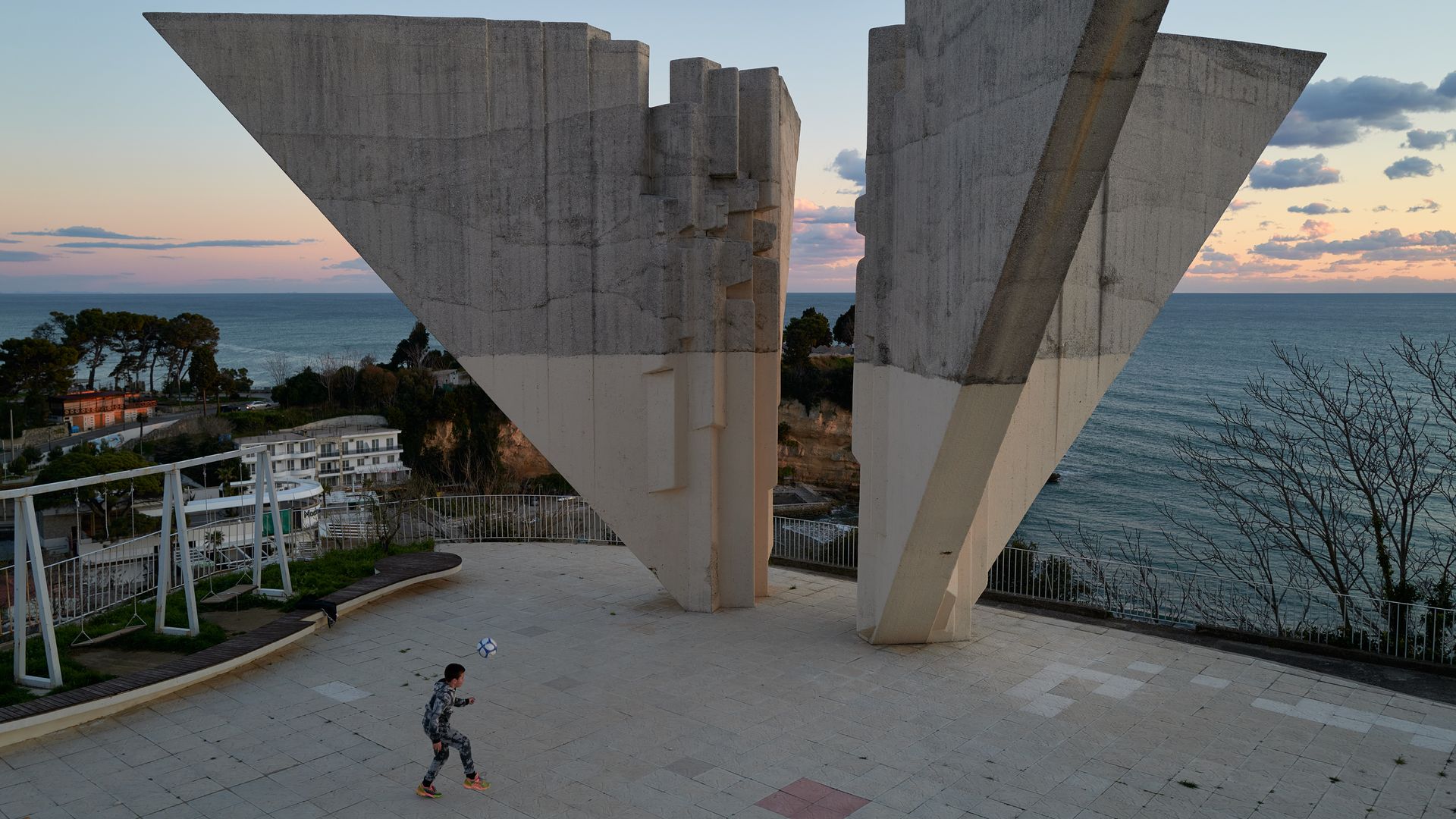 |
|
| Practicing soccer by a Yugoslav-era war memorial in Ulcinj, Montenegro. Photo: Pierre Crom/Getty Images |
| |
- Interview: Biden's World Bank pick sets ambitious course
- The case against Biden, Trump efforts to boost U.S. industry
- Senate votes to repeal Iraq War authorization 20 years later
- China's "Orwellian" plans for AI; Congress zeros in on China's economic coercion; Tech giants caught in the middle.
- Chinese tech giant Alibaba to split up
- Russia says it test-fired supersonic anti-ship missiles
- Judicial overhaul chaos threatens to unravel Netanyahu legacy
Quoted: "What is the use of this freedom if we can't afford rice?" — A quote from a laborer in an article written by journalist Samsuzzaman Shams at the Bangladeshi daily Prothom Alo. Shams was arrested on the grounds that his article had "smeared the government" |
    |
| |
| |
| A message from Brilliant |
| Sharpen your math, CS and data skills in a few minutes a day |
| |
 |
| |
| For professionals and lifelong learners alike, Brilliant is one of the best ways to learn. The deets: Bite-sized interactive lessons make it easy to level up in everything from math and data science to AI and beyond. Join 10+ million people building skills every day. Start with a free 30-day trial. |
| |
| Answers: 1. Athens; 2. Rome; 3. Lisbon (Vasco de Gama); 4. Moscow (St. Basil's); 5. Valletta (Knights Hospitaller, Malta); 6. Paris (Louis XVI;) 7. Vienna (Congress of Vienna); 8. Sarajevo; 9. Dublin (Easter Rising); 10. Berlin (Berlin Airlift); 11. Warsaw (Warsaw Pact); 12. Prague (Prague Spring). |
 | | Are you a fan of this email format? Your essential communications — to staff, clients and other stakeholders — can have the same style. Axios HQ, a powerful platform, will help you do it. | | |




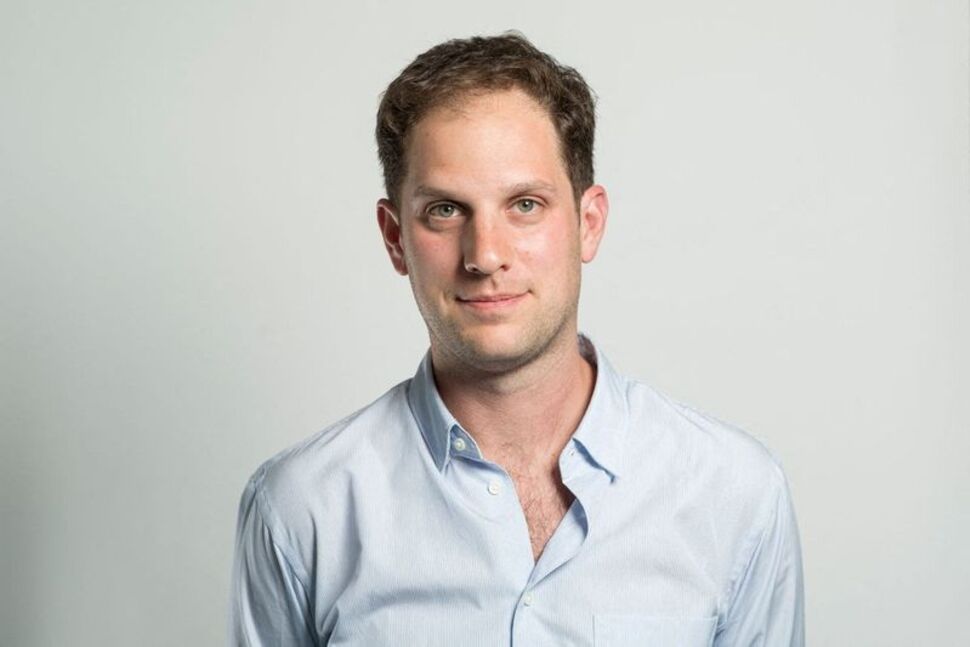







No comments:
Post a Comment